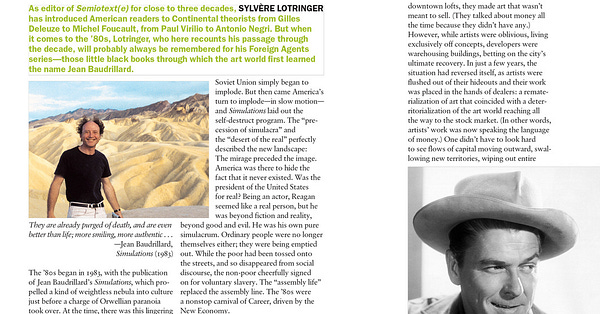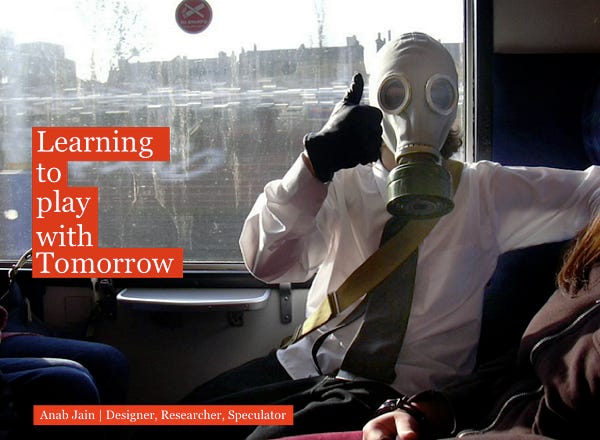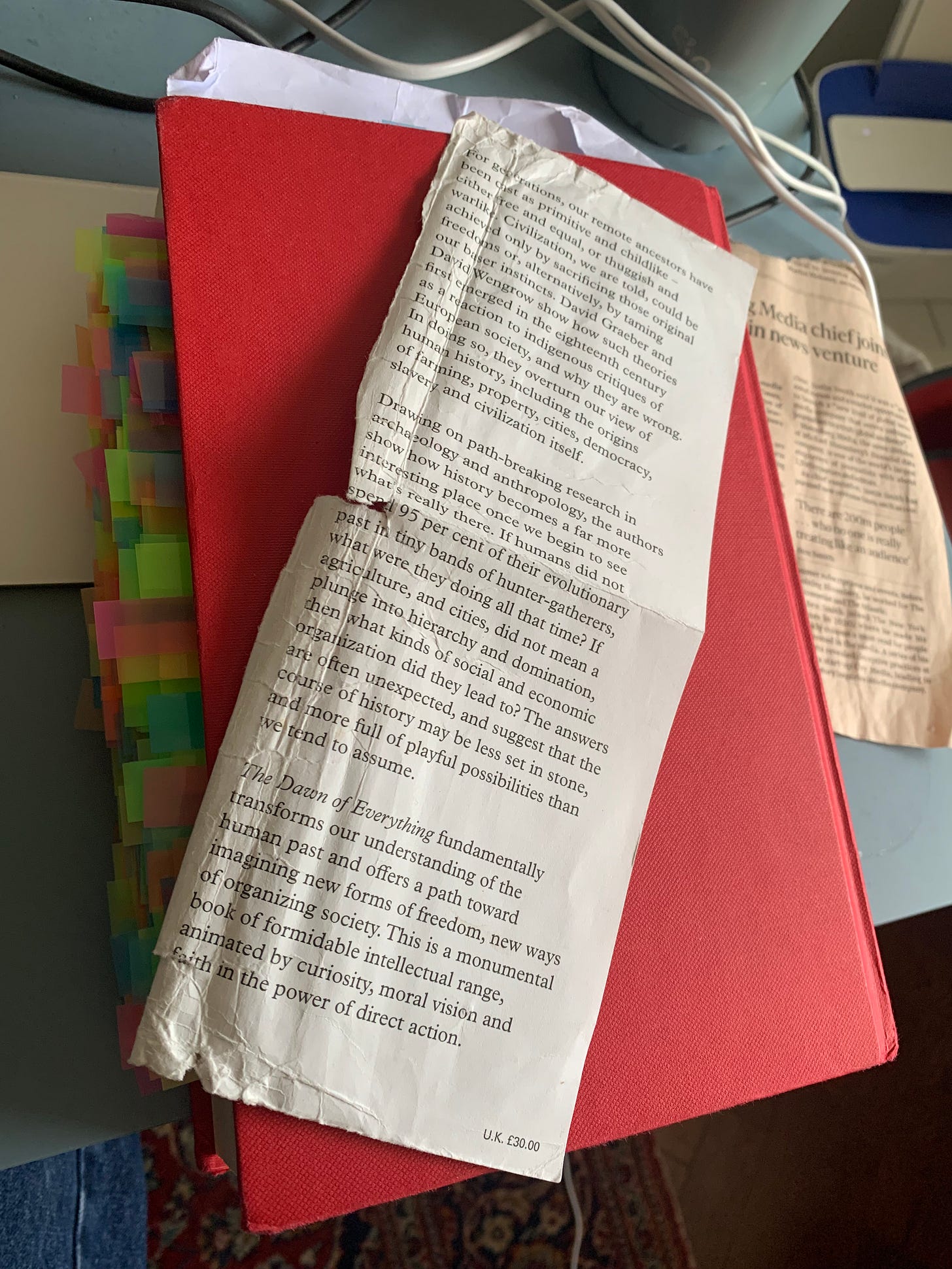"The Dawn of Everything" (and a new morning for politics)
Where an archaeologist, an anthropologist and a civic nationalist get us "unstuck"
I’ve read it, and lugged it around, until the dustcover disintegrated; and one side of the book is a coral reef of translucent page markers, where I seem to have found several interesting things on each page.
In a fortnight marked by pitiful leadership and big-power sabre-rattling, it has been a joy to dwell with David Wengrow and the late David Graeber’s The Dawn of Everything. I have savoured their revelations about the social creativity that truly marks the last 30-odd thousand years of human existence (a story which at least competes with wars, rulers, empires and classes).
It’s too important a book to condense down to a zinger-filled public review (believe me, I know that routine). And I predict that this text is going to be a presence in my life for years. So on this first pass, I’m going to try to talk about it as a tool-box, useful to my own intellectual and political agendas.
For one thing, the book is a soaring hymn to this: play and creativity are at the heart of human social development. In their conclusion, the Davids’ write:
Choosing to describe history… as a series of abrupt technological revolutions [Stone Age, Iron Age, Industrial Age, Information Age, etc], each followed by long periods when we were prisoners of our own creations, has consequences. Ultimately it is a way of representing our species as decidedly less thoughtful, less creative, less free than we actually turn out to have been.
It means not describing history as a continual series of new ideas and innovations, technical or otherwise, during which different communities made collective decisions about which technologies they saw fit to apply to everyday purposes, and which to keep confined to the domain of experimentation or ritual play. What is true of technological creativity is, of course, even more true of social creativity.
One of the most striking patterns we discovered while researching this book – indeed, one of the patterns that felt most like a genuine breakthrough to us – was how, time and again in human history, that zone of ritual play has also acted as a site of social experimentation – even, in some ways, as an encyclopaedia of social possibilities. (p.501, my italics).
The Dawn of Everything raids the most recent anthropological/archaeological research, to bring us society after society which did exactly as they describe above.
My favourite would be the Native American Wendat tribe, who (among many other creativities) would dethrone their tribal leaders during harvest and hunting seasons, treating them as co-workers in the gathering of food and resources. They they elevated them back to their status as tribal leaders, where they had some utility (but not total control) in guiding the collective celebration, during more barren seasons.
[This section produces a beautiful line: “the Wendat had play chiefs and real freedoms, while most of us today have to make do with real chiefs and play freedoms. (p. 131)” And the Wendats deliberated on everything, at great length and fluency.]
The Davids’ target is a giant Western intellectual assumption—that we tragically fell from simple, egalitarian hunter-gathering into complex, hierarchical farming society. And it is a tragedy, the assumption continues—with all the inescapable fatedness the term implies.
If we want to be organised enough to reap the bounties that come from agriculturalism and industrialism, then we’ll have to pay the price of social hierarchy and class societies. It’s a sad, inevitable fall from innocence.
Ah! Not so, say D&D. They give example after example of societies which, for instance, “play farmed” (that is, cultivating crops for medicine, beauty and art materials, as well as for food). They consciously chose not to intensify their activities into full-blown agriculture.
Indeed, some communities, having tried out the agrarian method, then deliberately retreated from intensive farming—too much like hard work—returning to and revising their pastoral activities.
Hours and days were reclaimed from the agricultural model, which these communities then spent richly deliberating what to do next with themselves, using many different forms of assembly (well before ancient Greece, and often involving potlatch or carnival). This was often without a class of leaders, rulers or potentates to supervene the process.
Please go to the book and enjoy D&D’s sumptuously written accounts of these cultures and societies. But to cut to the chase… Graeber and Wengrow obviously want to engage with the political present. Their history shows a human species that was, according to the material record, constantly and consciously experimenting—with groups, technologies, art, productive methods of all kinds.
We modern people like to think of ourselves as the acme of self-awareness and reflexivity. We are elective, metacognitive; we know what we’re up to. D&D urge us to think of this reflexivity as part of our human nature from our beginnings (or at least, the beginnings of us leaving artefacts to be discovered). And that this human nature manifested itself in the bewildering diversity of collective existences that Wengrow and Graeber have collated here.
Not playing with history - but history as play
If I’m allowed to punch the air, as a civilian play scholar for over two decades, then let me briefly do so. (Done.)
Much of my post-Play-Ethic research and thinking has been about the evolutionary and adaptive power of play. Meaning that play is not trivial, nor childish, but a crucial zone of “proximal development” for adults. Play helps us stay flexible enough to live with other complex humans, who have equal powers of self-reflection and symbolic invention.
(Graeber also wrote powerfully on play as constitutive of human civilisation—meaning the development of pleasurable civility. Sutton-Smith’s idea of play as “adaptive potentiation” also fits very nicely with D&D’s interests).
If play is indeed bolted hard into our human biology, you might have expected it to appear in the human record in more than marginal, secondary ways. The Dawn of Everything fulfils that expectation - asserting that play, in the form of play rituals, operates at the core of human communities. Indeed, human polities. TDOE shows we have been deliberately imagining, making, reforming and overthrowing our structures of power for tens of thousands of years.
Implicitly aware of the runaway exponentials of climate crisis and technological transformation, this book asks us why we have become “stuck” in these particular arrangements of power. Which are? A capitalism still too heedless of the toxic externalities it generates. Democratic states whose structures are stiff, corruptible and deeply unaccountable. And planetary technologies which aggrandise elites, and not the species as a whole.
Could we reclaim our historic (air quotes: “prehistoric”) capacity for morphing our social orders? Just at the point - a hundred seconds from midnight - when we really need to?
This book has some deep pointers to some answers on this, which may mean updating our political philosophy. The authors ask us to consider three basic “freedoms” in human history - the freedom to move, to disobey and to change our social arrangements. They put them in context here:
The freedom to abandon one’s community, knowing one will be welcomed in faraway lands; the freedom to shift back and forth between social structures, depending on the time of year; the freedom to disobey authorities without consequence – all appear to have been simply assumed among our distant ancestors, even if most people find them barely conceivable today.
Humans may not have begun their history in a state of primordial innocence, but they do appear to have begun it with a self-conscious aversion to being told what to do. (pp. 132-133).
If these freedoms are actually what Marx once called our “species-being”, then we may begin to conceive this “barely conceivable” politics.
And maybe that politics is a technologically-amplified, planet-referencing, cosmo-local anarchism as a way to collectively live together: one that is both exciting and resource-light. For explorations into that model, see the “playful rituals” I am involved in, with The Alternative UK.

The beginning of beautiful trouble?
I will share three caveats (warding against this becoming some shining model, which would be a perverse outcome):
The first caveat comes from D&D’s own answer to why we have gotten “stuck” in patriarchal, hierarchical, class-ridden, bureaucratic modernity. Their tentative suggestion is this: when inner/domestic life and outer/public life, or private emotion and social structures, become too aligned, then a deep subservience to the status quo (maybe even a micro-fascism) is easily instigated. That’s a story of charisma and ideology that goes all the way from the Pharaohs and the Aztecs, to the Nazis and the Windsors (not forgetting the Etonians).
However, I’ve also been wondering for a while, reading the neuroscience of Antonio Damasio and Mark Solms, about the power of homeostasis in the life of organisms, including human ones. Homeostasis is our mental craving to correctly anticipate what reality is going to throw at us (in order to improve our chances of survival).
Now, I’ve been interested in the “radical animal” for years (and one exhilarating thing about The Dawn of Everything is that is shows such a human creature exists, historically). But contemporary mind science is also alerting us to humans as the “conservative animal”, also—we complex mammals whose angst for balance and order might be perennially exploitable. Indeed, I wonder, might these exploiters arise from the everyday political acumen that Wengrow and Graeber also ask us to celebrate? (See Manos Tsakiris on ‘visceral politics’).
I would also point potential and current readers of TDOE to a recent, stirring, LeGuin-like novel called The Actual Star, by Monica Byrne. It ends up in 3012 with a society largely based on D&D’s three freedoms. But the background story is that of a nomadic world population comprising only several millions, after a cataclysmic climate meltdown that nearly managed our total extinction.
The surviving civilisation is hyper-conscious about how it uses advanced technologies, and behaves very much in the “ritual play” mode that The Dawn of Everything identifies (indeed, the book has a Mayan timeline - as well as a “Mayan tour-guide” timeline, in the present). No more spoilers - I recommend you read. But stories of catastrophism as the cause for revolution don’t quite seem adequate to the moment. It would be better, as Roberto Unger says, if we could “weaken the dependence of change on crisis”.
And finally, what kind of polity would get us “unstuck”, freeing us from our current, self-terminating arrangement? Could the aspiration to be a small, new nation-state in the 21st century be one of those useful polities?
I’ll admit that D&D robustly show how wrong it is to read our history as inevitably leading to states, in some teleological way. For them, it’s an enormous mistake to take human development as mere stages towards our currently accepted form of sovereignty and democracy.
Yet maybe the new state I’d like to see could be argued for, in D&D’s terms. I was very struck this week, by a few lines from Anthony Barnett’s capacious essay on Tom Nairn, Gordon Brown and the Break-up Of Britain, in Open Democracy:
Nairn insists upon a materialist but non-Marxian worldview in which non-economic differences remain integral to any human future…No effective challenge to the power of capital will be mounted until it can encompass Nairn’s insistence on the heteroclite, always deviant nature of development.
What is Barnett talking about? Nairn, the great Scottish theorist of nationalism, is rendered by Barnett as having a tortured relationship with his own Marxist past (we’ll leave Mr. Brown’s thrawnness to one side).
This past assumed, crudely, that economic class struggle was the motor of history. The torture comes from Nairn’s recognition that nationalism - a two-faced Janus, looking both backwards into an imagined history, and forwards into a desired future - is an equal motor of change to economics.
Indeed, nationalism is triggered by “uneven development”. This means the way that the machine of capitalism, by means of the rule of the market, tries to homogenise an often rugged landscape, made up of pre-existing economies, identities, cultures. Capitalism can meet resistance—or at least strong negotiations about its terms of advance—by means of forms of nationalist reaction.
Sometimes, as in the case of Scottish independence politics, this resistance is less reactive, and much more progressive—a positive project, one face of the Janus shining brighter than the other. (In Scotland, this project is currently being taken forward by one centre-left and one left-green party, mandated to conduct an independence referendum, under a governing arrangement in the Scottish Parliament).
Allow it
So that was a giddy intellectual fortnight. I’m left wondering… Is this “heteroclite, always deviant nature of development” the same thing for Tom Nairn, ex-Marxist civic nationalist, as it might be for David Wengrow and David Graeber, archeological/anthropological left-green anarchists? (Not to mention Tom Nairn’s later turns to anthropology and ethology itself, like this, which would occasion another 2000-odd words at least).
Ideally, I would like both approaches to “unstick” our present political economy. A movement where bottom-up community innovation meets top-down systemic openness, raising a swirl of possibilities. A high-energy democracy, which I hope the authors of The Dawn of Everything would love to commence a new morning of politics. As they might say, in one of my locales: “Allow it”.
Buy The Dawn of Everything here.
LINKTOPIA
The middle of anything
🐻“TED is probably best understood as the propaganda arm of an ascendant technocracy. It helped refine prediction into a rhetorical art well-suited to these aspiring world conquerors — even the ones who fail.” From the excellent The Drift.
And yeah, thanks, Joyce:


An extraordinary tale of editorial brio (I was never without Semiotext(e)’s wee black books in 80s/90s):


♾🌎♾ “The world most of us have known, of nation states, the rule of law, the so-called free market, and the printing press is ending, slowly but surely. This process of undoing seems inexorable and it is happening partly because capitalism is running out of frontiers, partly due to the transgression of the planet’s ecological boundaries, partly due to the impact of the internet and artificial intelligence and virtual reality on our lifeworlds, and partly because our democracies now lack viable informational ecosystems to inform collective debate and decisions.” So what’s an education that teaches to that, asks Jonathan Rowson and Zak Stein?
Vinay Gupta made a neat generational point about crazy crypto valuations (echoing my recent column):


Welcome to WellTECHers, the Ordinaries, the World x Lifers with their mantra ”nature is economy is democracy”, other movements like Life Places, DEGRO and POSTGRO. Anthony Painter (leaving the RSA) makes a fine fist of backcasting from circa 2080.
And here’s yer proper soothsaying from Superflux, 2009


All comments most welcome below. Please do share to those who you think would like this material. Posting next week, very best, PK






Thanks. I've pre ordered the paperback, so will wait ...keep thinking I need to pluck up the courage and will power to read Debt. My son bought it for me (proud dad syndrome!),but it's sat there like my copies of Ulyssees ,The Anarchy and Peter Wilson's Magnus opus on the Thirty Years war !
Really interesting. I'm English (Irish and Scots forebears ), your Scottish. As an amateur historian (admittedly with a history degree , gained during the Marxist ascendancy ),I'm really interested in the rise of the nation state and how that began to frame our thinking about our personal and political boundaries. When stories ,narratives and rituals to underpin nation state stories arise and how left and right as traditionally conceived claim their own meta narrative about who 'we' are . Long intro , but do D&D consider this dimension ?